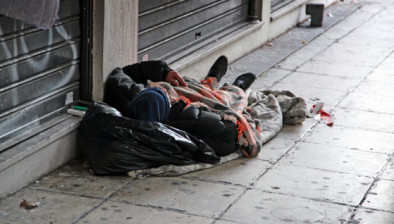JRF: Housing lifeline required to ease financial strain on households
The Joseph Rowntree Foundation (JRF) has called on the Scottish Government to act quickly to avoid a potential autumn spike in evictions as financial strains take hold on households across the country.

The call is a recommendation from its new report, A stronger Scottish lifeline in the economic storm, which sets out how to create a stronger Scottish lifeline covering jobs, housing and social security.
According to the report, legal protections should be extended until September 2021 and pre-action measures put in place to ensure genuinely affordable repayment plans are made. The Scottish Government also should prepare to step in where tenants are independently assessed as being unable to pay.
The report from Dr Jim McCormick and Deborah Hay also suggests that how well Discretionary Housing Payments and the Scottish Welfare Fund are meeting need should be gauged, and loan finance for landlords should be tied to high standards on maintenance, energy efficiency and affordability.
The JRF said: “Lockdown was a necessary response to a public health crisis, but it has created significant economic strain. In a compassionate society, we need to create a housing lifeline to ensure people can weather the storm. New polling evidence in June for JRF (YouGov, 2020) tells us about the financial pressures bearing down on many now and of other storm clouds looming on the horizon.”
The report warmly welcomed the progress being made to ensure there is no return to rough sleeping in Scotland and commended the detailed recommendations of the re-convened Homelessness and Rough Sleeping Advisory Group.
But it warned that a “strong, preventative approach” must be taken in Scotland over the coming months to ensure a new cohort of those threatened with homelessness does not emerge to undermine this progress.
Making greater use of devolved powers, the JRF said a housing lifeline for tenants in Scotland should also include:
- A commitment that no-one is evicted into homelessness from July 2020, a core part of the plan prepared by the Everyone Home alliance which JRF is pleased to support. This is especially important for those possession cases not covered by the emergency legislation.
- Improved independent advice, advocacy and representation support available to private and social tenants.
- An extension to current legal protections beyond September 2020, keeping extended notice periods and maintaining discretionary powers of the Housing Tribunal system until September 2021 for all grounds, covering the likely lag time and long tail of financial distress.
- Development of effective pre-action measures to ensure that landlords and tenants are supported to agree genuinely affordable repayment plans, and that the Scottish Government steps in where tenants are independently assessed as being unable to pay, to ensure they can remain in their home until September 2021.
- Ensuring loan finance for private landlords is tied to high standards on repairs, maintenance, energy efficiency, security and affordability for tenants, including switching to the new PRS tenancy if not already in place and a freeze on rent increases for the rest of 2020.
- Close monitoring and evaluation of how well Discretionary Housing Payments(DHPs) and the Scottish Welfare Fund are meeting need. If necessary, guidance should be revised to allow for a temporary period of topping up tenant incomes (including a consistent approach on rent arrears) via DHPs, as part of the independent financial assessment. Support available should be actively promoted.
- Local integration for Universal Credit recipients is also needed to assess the extent of gaps in housing costs support particularly for private tenants and groups missing out on adequate support (students, young people, those with No Recourse to Public Funds, tenants in high costs areas).Further flexibilities may be needed in Scotland, to strengthen the prevention of homelessness.
- A commitment to long-term finance beyond 2021 to build and refurbish more social and affordable housing, and purchase stock from landlords for long-term lets where needed, in line with recent published evidence of demand for 53,000 homes by 2026 (Dunning et al, 2020).
- An ongoing commitment to boosting participation, where low-income tenants help to shape development of housing policy and practices as equal partners, on the same footing as social and private landlords. JRF and our partners are keen to support this happening.
Scottish Greens housing spokesperson Andy Wightman MSP said the report highlights need for urgent tenant protections.
He added: “The JRF is right to warn of a potential spike of autumn evictions once the modest emergency protections lapse. The Scottish Government’s unwillingness to support tenants has left thousands of people across Scotland worrying about the security of the roof over their head.
“The housing minister rejected my proposals to protect tenants when we debated emergency coronavirus legislation in May, instead preferring to throw money at landlords. Since then he has failed to outline a single measure to protect tenants from being evicted after the emergency period due to debts accrued during it.
“Now that the housing tribunal has reopened, and tenants are once again facing eviction, urgent action is required. The Scottish Government must act to protect tenants before it’s too late.”
Shelter Scotland has also urged the Scottish Government to “act swiftly” to extend eviction protections after new figures revealed a decrease in the number of Scots in employment and high numbers of income support.
The latest Labour Market Statistics from the Office for National Statistics (ONS) found that unemployment in Scotland rose to 4.3% between March and May as the coronavirus lockdown restrictions hit the jobs market hard.







